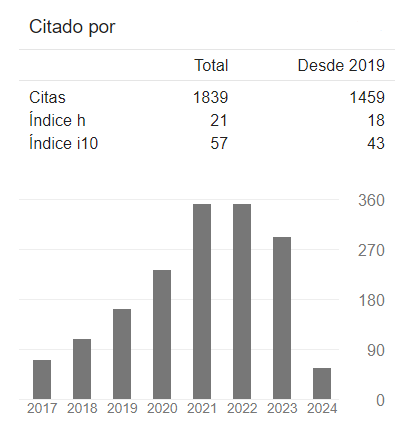The monopoly of the truth in the “Fake News” Era
DOI:
https://doi.org/10.24142/raju.v14n28a4Keywords:
Traditional media, monopoly of the truth, fake news, social media, post-truthAbstract
This article aims to analyze the monopoly of the truth of traditional media and its ability to influence voters, changing the election’s results. The performance and importance of traditional media and social networks will be studied through a historical and comparative approach. This work also aims to understand the social transformation in the era of post-truth, which changed the publishing market, encouraging the dissemination of fake news. The key priority is to capture the true impact on the political and democratic debate of social networks, traditional media and fake news, as well as their ability to influence elections.References
Allcott, H., & Gentzkow, M. (2017). Social Media and Fake News in the 2016 Election. Journal Of Economic Perspectives, 31(2), 211-236. doi: 10.1257/jep.31.2.211
Arendt, H. (1967). Truth and Politics. The New Yorker. Recuperado de https://www.newyorker.com/magazine/1967/02/25/truth-and-politics
Bakshy, E., Messing, S., & Adamic, L. (2015). Exposure to ideologically diverse news and opinion on Facebook. Science, 348(6239), 1130-1132. doi: 10.1126/science.aaa1160
Cardon, Dominique (2012). Democracia na Internet: Promessas e Limites. Rio de Janeiro: Forense Universitária.
Castilho, C. (2018). Apertem os cintos: estamos entrando na era da pós-verdade. Recuperado de http://observatoriodaimprensa.com.br/imprensa-em-questao/apertem-os-cintos-estamos-entrando-na-era-da-pos-verdade/
Deane, J. (2005). Media, democracy and the public sphere. In T. Eriksen, Media and Glocal Change. Buenos Aires: CLACSO. Recuperado de http://bibliotecavirtual.clacso.org.ar/ar/libros/edicion/media/16Chapter10.pdf
Dumitrscu, D., & Mughan, A. (2010). Mass media and the democratic politics. In K. Leicht & J. Jenkins, Handbook of Politics: State and Society in Global Perspective (p. 490). New York: Springer. Recuperado de http://doi.org/10.1007/978-0-387-68930-2
Gans, H. (2003). Democracy and the News (pp. 69, 89). Londres: Oxford University Press.
Giacoia Junior, O. (2017). E se o erro, a fabulação, o engano revelarem-se tão essenciais quanto a verdade?. Recuperado de https://www1.folha.uol.com.br/ilustrissima/2017/02/1859994-e-se-o-erro-a-fabulacao-o-engano-revelarem-se-tao-essenciais-quanto-a-verdade.shtml
Gottfried, J., & Shearer, E. (2018). News Use Across Social Media Platforms 2016. Recuperado de http://www.journalism.org/2016/05/26/news-use-across-social-media-platforms-2016/
Guess, A., Nyhan, B., & Reifler, J. (2018). Selective Exposure to Misinformation: Evidence from the consumption of fake news during the 2016 U.S. presidential campaign [Ebook]. Recuperado de https://www.dartmouth.edu/~nyhan/fake-news-2016.pdf
Kreitner, R. (2018). Post-Truth and Its Consequences: What a 25-Year-Old Essay Tells Us About the Current Moment. Recuperado de https://www.thenation.com/article/post-truth-and-its-consequences-what-a-25-year-old-essay-tells-us-about-the-current-moment/
Mancuzo, C., Silva Junior, R., & Boni, P. (2012). O fim do furo: encruzilhadas do jornalismo em tempo real no ambiente online. In XXXV Congresso Brasileiro de Ciências da Comunicação (p. 7). Fortaleza: Intercom – Sociedade Brasileira de Estudos Interdisciplinares da Comunicação. Recuperado de https://goo.gl/kQsCLc
Marinoni, B. (2015). Concentração dos meios de comunicação de massa e o desafio da democratização da mídia no Brasil (p. 15). São Paulo: Friedrich-Ebert-Stiftung Brasil. Recuperado de https://goo.gl/M8LLxK
Pavlik, J. (2012). Media in the Digital Age (p. 4). New York: Columbia University Press.
Rubim, A., Azevedo, F., Leal, C., Alcântara, D., & Magalhães, L. (2003). Os Estudos Sobre Mídia e Eleições no Brasil. In 27º Encontro Anual da ANPOCS (p. 2). Caxambu: Associação Nacional de Pós-Graduação e Pesquisa em Ciências Sociais. Recuperado de https://goo.gl/hgFgNi
Singer, P., & Brooking, E. (2018). LikeWar: The weaponization of social media (p. 234). New York: Houghton Mifflin Harcourt.
Waisboard, S. (2006). In journalism we trust? Credibility and fragmented journalism in Latin America. In K. Voltmer, Mass media and political communication in new democracies (p. 67). London: Routledge.
Published
How to Cite
Issue
Section
License
La rivista consente all'autore (s) di mantenere i diritti di pubblicazione senza restrizioni.
Le journal permet à l'auteur (s) de conserver les droits de publication sans restrictions.
The journal allows the author (s) to retain publication rights without restrictions.
La revista le permite al autor(es) retener los derechos de publicación sin restricciones
Die Zeitschrift ermöglicht es dem / den Autor (en), Veröffentlichungsrechte ohne Einschränkungen zu behalten.
A revista permite que os autores mantenham os direitos de publicação sem restrições.











































